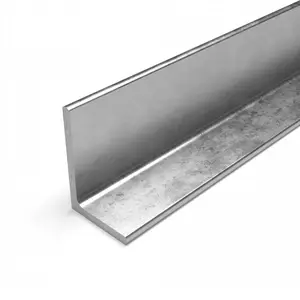
Low Price2x2 Angle Iron Prices Galvanized Steel Slot Angle Bar Profile Steel Anglets Metal Angle Iron Sizes And Prices










The term "types of angle iron" encompasses a range of structural iron shapes whose cross-sections resemble an 'L'. These versatile materials are integral to construction and engineering projects, providing stability and strength where it's most needed. The angle iron steel type one chooses can significantly impact the integrity and durability of a structure. Alibaba.com hosts a variety of angle irons suitable for diverse industrial applications.
Angle irons come in various sizes and materials, each tailored for specific structural needs. The l shaped angle steel is a common form, providing two planes of support, which enhances the load-bearing capacity and stability. The types of iron angle products range from mild steel to high-strength, low-alloy versions, each offering different properties such as ductility, tensile strength, and corrosion resistance. For instance, the cast iron box angle plate is known for its rigidity and is often used in precision applications, while the dexion type slotted angle iron is favored for its adjustability and ease of assembly in shelving and storage solutions.
The physical structure of angle iron is designed to provide a balance of strength and flexibility. The standard 'L' shape consists of two legs that meet at a 90-degree angle, which can vary in length and thickness depending on the application. This shape is inherently strong and resists bending and twisting forces effectively. In some cases, additional elements like ribs or reinforcements are added to enhance this resistance, especially in types of angle iron intended for heavy-duty applications.
Materials used in the production of angle iron include carbon steel, alloy steel, and sometimes non-ferrous metals for specialized applications. Carbon steel is the most common due to its excellent balance of durability, strength, and cost-effectiveness. Alloy steels, such as those in the SS400-SS540 series, include additional elements like manganese or silicon to improve specific properties like toughness and wear resistance. The choice of material is crucial, as it directly affects the angle iron's performance and longevity.
Angle iron is indispensable in various industries, including construction, automotive, and manufacturing. In construction, it is used for framing, supports, and brackets, contributing to the stability of buildings and bridges. In the manufacturing sector, angle iron forms the framework of machinery and equipment. Its versatility and strength have made it a cornerstone in the development of infrastructure, playing a pivotal role in the growth and efficiency of businesses.
The primary function of angle iron is to provide structural support. It can bear loads, maintain the shape of structures, and connect different parts of a construction securely. The types of angle iron with slotted designs, like the dexion type slotted angle iron, offer modular functionality, allowing for adjustable structures such as shelving units that can be customized to various heights and dimensions.
Angle iron's distinct characteristics include its 'L' shape, which provides two axes of support, making it an excellent choice for corner reinforcement. The variety of available surface treatments, such as galvanization, ensures that angle iron can withstand harsh environments without corroding. Additionally, the availability of different grades and materials allows for a tailored approach to each project's specific needs.
Using angle iron in projects brings numerous benefits, including increased structural integrity, cost-effectiveness, and versatility. Its ease of installation and maintenance makes it a practical choice for many applications. The ability to customize the length, width, and thickness of the angle iron means that it can be adapted to a wide range of uses, from simple home repairs to complex architectural designs.
Effective use of angle iron involves proper installation, which may require bolting, welding, or riveting, depending on the application. Choosing the right angle iron steel type is crucial for the success of a project. For maintenance, regular inspections for signs of wear or corrosion are recommended, especially for angle irons used outdoors or in corrosive environments. Cleaning can typically be done with mild detergents, and any surface damage should be addressed promptly to prevent deterioration.
The target audience for angle iron includes construction companies, manufacturers, and DIY enthusiasts. Each group requires different types of angle iron based on their specific needs, such as weight capacity, ease of installation, or resistance to environmental factors. Suppliers on Alibaba.com cater to this diverse clientele by offering a wide range of products and customization options.
The grade of angle iron plays a crucial role in its performance. Higher grades like the A36-a992 series are engineered to bear heavier loads and resist bending under stress, making them ideal for major structural components in construction. On the other hand, lower grades such as the Q195-Q420 series might be used where less stress is anticipated or where cost savings are a priority. The choice of grade should align with the engineering requirements and safety standards of the project.
Selecting the appropriate angle iron steel type involves considering factors such as load-bearing requirements, environmental conditions, and the type of connections that will be used. For instance, a cast iron box angle plate might be preferred for precision applications requiring a square reference surface. The dexion type slotted angle iron offers versatility with its pre-punched holes for easy assembly. Consulting with a structural engineer and reviewing the project specifications can help in making an informed decision.
To ensure the best quality, businesses should source angle iron from reputable suppliers on Alibaba.com who provide detailed product specifications and adhere to strict quality standards. It's also important to consider the material's grade, surface treatment, and the supplier's ability to offer customized processing services. Verifying certifications and conducting quality checks upon delivery can further guarantee that the angle iron meets the expected standards of quality and performance.